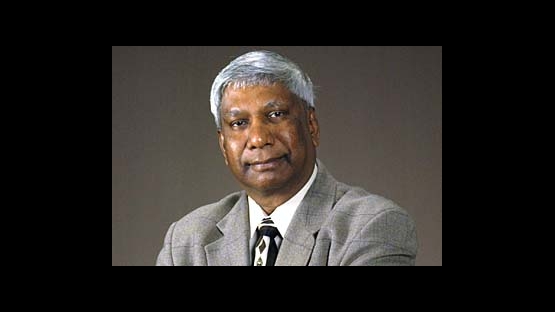The IAEA is working with Krishnan Suthanthiran, one of its worldwide business partners, to encourage the development of more affordable radiotherapy machines - a crucial front in the battle to subdue the developing world´s cancer epidemic.
Within just six years, the World Health Organization expects cancer´s death toll in the developing world to exceed that of the combined three illnesses targeted by the United Nation´s Millennium Development Goals: HIV/AIDs, tuberculosis and malaria. Yet many countries in the developing world lack even one radiotherapy machine, which is used in curative treatment and to reduce pain in advanced cancer patients.
That is one reason why Mr. Suthanthiran, born to poverty in India and now a multimillionaire philanthropist, supports the IAEA´s challenge to industry: to produce radiotherapy units that cost one-third of their current price, a reduction to US $1 million from US $3 million.
As part of this partnership, Mr. Suthanthiran has donated radiotherapy equipment to both Tanzania and Nicaragua, thereby doubling both countries´ cancer treatment potential. But his goal is more ambitious.
"People tend to make technology too complicated, too many bells and whistles. Our goal as a company is to focus on technologies that are optimal: simple to use and at a reasonable cost," Mr. Suthanthiran says, calling on other companies to follow suit. "Other companies have focused on complex technology... I wish they would focus (on optimal technologies, but) I´m not sure that they will actually do so."
Mr. Suthanthiran´s overall vision is bold: nothing less than a total solution to developing world cancer. Like the IAEA´s Programme for Action for Cancer Therapy (PACT), Mr. Suthanthiran is working toward the sustainable introduction of comprehensive cancer care from prevention, early detection and treatment through to palliative care. Both aim to improve access to care on the ground.
"Our focus is what I call a total solution... from A to Z," says Mr. Suthanthiran, who founded engineering firm Best Medical International in 1977 in Virginia, USA, and its not-for-profit arm, the Cure Foundation, in 2007. "So under the total solution programme, the Cure Foundation plans to set up 1 000 cancer centres globally."
The first five will open this year in the Washington, D.C. area. As part of this first wave, another will open in India either this year or next, the result of a partnership with Indian medical colleges.
"We want to do basically everything, provide a turn-key operation. We will bring in trained professionals and make sure they follow the guidelines. We will incentivise them based on clinical outcome and patient satisfaction."
For Mr. Suthanthiran, this work is a calling. "What I´m engaged in is not a business but a purpose in life. I lost my father to cancer. As a company we are manufacturing products that are saving millions of lives worldwide," he says. "We do the right thing for the right reasons, one patient at a time."


